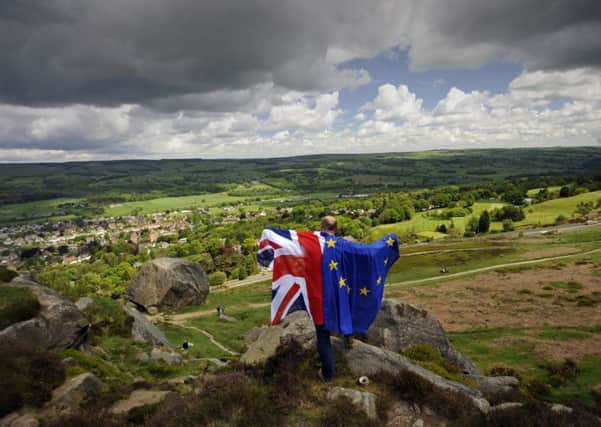EU referendum: 'Whether we stay in or we come out - we will survive'


MP Stuart Andrew chaired a session with guests including veteran Labour politician Austin Mitchell, an ardent ‘leave’ campaigner who told the gathering at Crawshaw Academy that the EU had been “disastrous” for Britain’s industry.
Referring to the UK’s lack of power in negotiating its own trade agreements, Mr Mitchell told the audience: “Obama said we are at the back of the queue. But we are not even in the queue. Because negotiations are done by Europe.” He claimed Britain has gained little from the European Union that it had been promised in 1973 when it went in.
Advertisement
Hide AdAdvertisement
Hide AdA mixed audience kept the panel, made up of five men, busy with questions, with some also commenting that the national debate had been “terrible from both sides”.
Discussion also focused on the potential impact on public services of more countries joining the EU, with concern that the NHS was “drowning” under the weight of extra demands from EU migration.
Questions were also asked about whether more EU member states meant reduced “diplomatic clout” for the UK round the negotiating table.
However ‘remain’ campaigner Les Parkes said there were huge benefits to having more member nations and it was “the more the merrier”.
Advertisement
Hide AdAdvertisement
Hide AdThe audience was told by the Brexit camp that it was important for the UK, the fifth biggest economy in the world, to build its own trade partnerships.
However ‘remain’ campaigners said there were no guarantees that leaving the EU would bring those deals around quicker.
“This should be about trading,” said Andrew Percy, a ‘Leave’ campaigner and MP for Brigg and Goole.
“It shouldn’t be about dictating every aspect of our lives.”
Advertisement
Hide AdAdvertisement
Hide AdHe told the forum that a mountain of legislation and a “democratic deficit” had damaged Britain’s interests over the years.
After the debate, the YEP caught up with some of those who had quizzed the panel most vociferously.
Neil Hunt, who is voting to leave the EU tomorrow, was especially concerned about the impact of EU laws on British manufacture and trading autonomy.
“I’m not a fan of the way the whole European project has gone,” he said.
Advertisement
Hide AdAdvertisement
Hide Ad“I am old enough to remember the first referendum, and I remember all the promises that were made about it just being a trading block.
“But all of those promises have failed to be kept.
“Those at the heart of Europe want further political union, Britain doesn’t. If we can’t reform it, we are perfectly capable of going our own way.”
Dawn Collins is also voting ‘leave’ tomorrow. She said: “My main reasons are the amount of legislation - and the lack of influence we have in the democratic process within Europe.
“I don’t want to cut ties with Europe, we actually enjoy going on holiday to France.
Advertisement
Hide AdAdvertisement
Hide Ad“But the key thing is we have given all the power to them, and can’t make any decisions ourselves. We need to stop now, and think about what we want as a country from Europe and renegotiate.”
Jackie Laybourn, who asked the panel about the effects of a leave vote on the most vulnerable in society, said afterwards: “Whether we stay or whether we go, I am interested in what impact it will have on the most vulnerable in society - and on the most advantaged.
“Whenever you have change in society, it always costs more. I think that whatever we do, and particularly if we leave, the costs of being a citizen will become higher. And how are people who already have so little going to survive?
“But whether we stay in or we come out, we will survive, I have no doubt about that.”